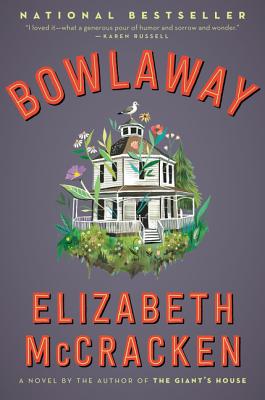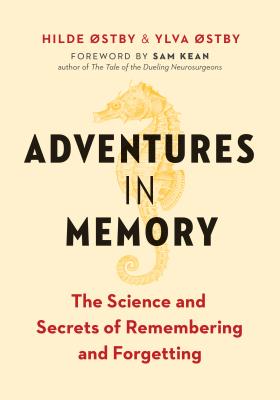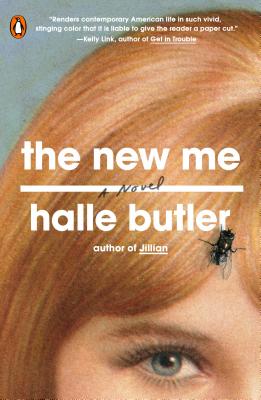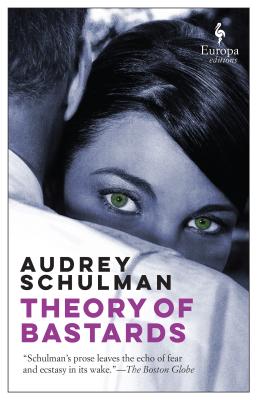The primate remembers
Elizabeth McCracken's latest novel, Bowlaway, is the story of a woman who wakes up in a graveyard and then builds a candlestick bowling alley with all the surety and fervor of a prophet compelled by God. "It took her two months to build the bowling alley," McCracken writes. "Nobody had seen a building go up with such speed, brick by brick, like knitting a sock."
There aren't any candlepin bowling alleys within a thousand miles of Seattle, so allow me to explain for those who may not know: candlepin bowling follows the same basic rules as the game of bowling we enjoy on this coast, but everything else is different: the balls are palm-sized, and you get three rolls per turn instead of two. The pins are straighter and harder to hit. It is at once more accessible and more difficult than what Seattleites would refer to as traditional bowling.
I come from Maine, the northernmost tip of New England, land of candlestick bowling, and so I had saved Bowlaway for a trip home, in order to read the book in its proper context. I'm glad I did: Bowlaway is a New England story through and through. It's a book that's choked with history and tradition and secrets and long, unhappy lives. It's as grand and as small as New England.
There's no fear in the writing of Bowlaway. McCracken happily gets as weird as possible in the book, telling the story of Bertha Truitt, her candlepin bowling alley, and what happens to all the lives she touches. Characters die of bizarre causes that no other modern writer — cursed as they are with their painful addiction to "realism" — would allow beyond a first draft. The story shifts focus multiple times, mutating from a biography of a willful woman to a family history to a sketch of an intergenerational curse.
Bowlaway contains dozens of stories, but at the center of each one is the bowling alley. The book shares a candlepin bowling lane's insistence on doing things differently, in the name of maintaining customs so rooted in the past that nobody remembers their origins. It is, in other words, a thoroughly New England book.
I went to Maine to take care of family business, to clean out old rooms and sift through yellowed photographs. Every time I head to that particular part of the world, I feel as though I step out of the corporeal plane and into one made completely of memory.
It seemed appropriate that the second book I chose to read on my trip was Adventures in Memory: The Science and Secrets of Remembering and Forgetting by Hilde and Ylva Østby. Hilde Østby is a novelist, and Ylva Østby is a neuropsychologist specializing in memory, and so the two Norwegian sisters set out to write a beautifully written science book about what memory is and how it affects us as humans.
Speaking as someone who has lost and is currently losing family members to the fog of memory disorders, Adventures in Memory didn't offer too much that surprised me. I've read enough about memory that I am very familiar, for instance, with the anecdotes about eyewitness testimony being ridiculously unreliable. I know that the seeming granite foundation of memory is actually a shifting quicksand.
But while little of Memory is revelatory, the sisters succeeded in their efforts to make the book compulsively readable. Their compassionate accounts of PTSD and survivor trauma alone make the book indispensable for modern times. When I'm in Maine, I detach from the daily news cycle, and so the occasional headline that caught my eye on a far-off TV screen or in a news alert on my phone would carry a kind of memory fog around it. Ah, yes, the president said something horrific about immigrants. Didn't he already say that, months ago? Or is this a new statement?
In this way, as I pored through boxes of old class pictures and school papers — some that I remembered, some that I didn't — the Østby sisters helped me keep in mind that insurmountable distance between our past and the present day.
Perhaps the perpetual bubble of deja vu that I found myself floating inside was not the best state of mind to read Halle Butler's novel The New Me. The book — about a young woman who can't seem to feel anything but a deep self-loathing and a mild sense of discomfort with everything around her — feels like a dozen other books I've read before. Ten years ago, The New Me would have been a roman a clef by a disaffected millennial. Now, Millie — the young woman at the book's center — is more like Generation Z. Some of the trappings change, but the story remains basically the same.
But once you push through the familiarity of The New Me, you can appreciate the craft of the book. Butler's writing is gorgeous. If a reader isn't careful, Millie's depression will soon become inseparable from their own. The way she stumbles, in a lifelike torpor, through an endless succession of demeaning temp jobs with no prospect for anything better will feel recognizable even for people who love their lives. We've all been Millies before, struggling to find joy in a joyless situation, not realizing that everyone around us can see how raw and rough we are inside.
By the time Millie fled to the relative safety of her parent's home, I was entirely on her team. As I read the book in the same distant land where I grew up, peering at the letters on the page through the fog of memory, I couldn't quite tell where Millie ended and I began.
I don't remember getting home. I don't remember taking my clothes off. When I wake up I don't remember much at all at first. Just that it feels so fucking familiar.
Did Millie say that? Or did I? Is there a difference?
And then sometimes a book happens along and it makes everything better.
I have a confession to make: it's been a few months since a novel has truly transported me. I've read good novels over the last six months, but no matter how good they are — Bowlaway is clearly better than the vast majority of fiction published in America in any given year, for instance — they just don't reach inside me and turn on those light switches in my core.
Audrey Schulman's novel Theory of Bastards was published almost exactly a year ago this week, but the book found its way into my vacation pile through a fluke of placement. I'm so glad it did. The book — about a researcher suffering from physical and mental sexual dysfunction who embarks on a study of the sexual habits of bonobos in a near-future sci-fi world — gets more and more fraught as it goes on.
At first, Dr. Francine Burke is merely an eccentric and slightly off-putting protagonist — an antisocial MacArthur "Genius" grant-winner who is a little too interested in primate sex. But the weirder and more aggressive she gets, the more the reader falls in love with her. As the primate house falls prey to climate-change-inspired weather events, and as disaster approaches, Burke's story becomes more and more compelling. Schulman whips us back and forth in time, until we understand some more of what makes Burke behave the way she does.
I don't want to give too much away about the book — it goes to some truly strange places — but I want you to know that this is a book that gave me exactly what I needed, exactly when I needed it. Schulman's commitment to the book's themes — of research, of evolution, of overcoming heartbreak — is unshakable, and she has something to say that literally nobody else on earth could say in quite this way.
In the end, I had to save most of Theory of Bastards for the airplane back to Seattle, so I could reserve hours of unconstrained reading time. I sat in my seat and turned pages like the book was on fire, dreading every flip of the page that brought me closer to the end. The primates in this book — human, bonobo, otherwise — moved into my brain and refused to leave. As I flew through the air from one group of humans to another, from one set of memories to another, from one land to another, I felt more connected to everything than I had in months. What a spectacular gift this book is.
Paul is a co-founder of The Seattle Review of Books. He has written for The Progressive, Newsweek, Re/Code, the Utne Reader, the Los Angeles Times, the Seattle Times, the New York Observer, and many North American alternative weeklies. Paul has worked in the book business for two decades, starting as a bookseller (originally at Borders Books and Music, then at Boston’s grand old Brattle Bookshop and Seattle’s own Elliott Bay Book Company) and then becoming a literary critic. Formerly the books editor for the Stranger, Paul is now a fellow at Civic Ventures, a public policy incubator based out of Seattle.
Follow Paul Constant on Twitter: @paulconstant
Other recent reviews
Talk about the weather
-
Interpretative Guide to Western-Northwest Weather Forecasts
March 27, 2018
72 pages
Provided by publisherBuy on IndieBound
The man show
-
The Sexiest Man Alive
October 01, 2018
72 pages
Provided by publisherBuy online
Accidentally honest
-
The Shame of Losing
October 01, 2018
264 pages
Provided by authorBuy on IndieBound



